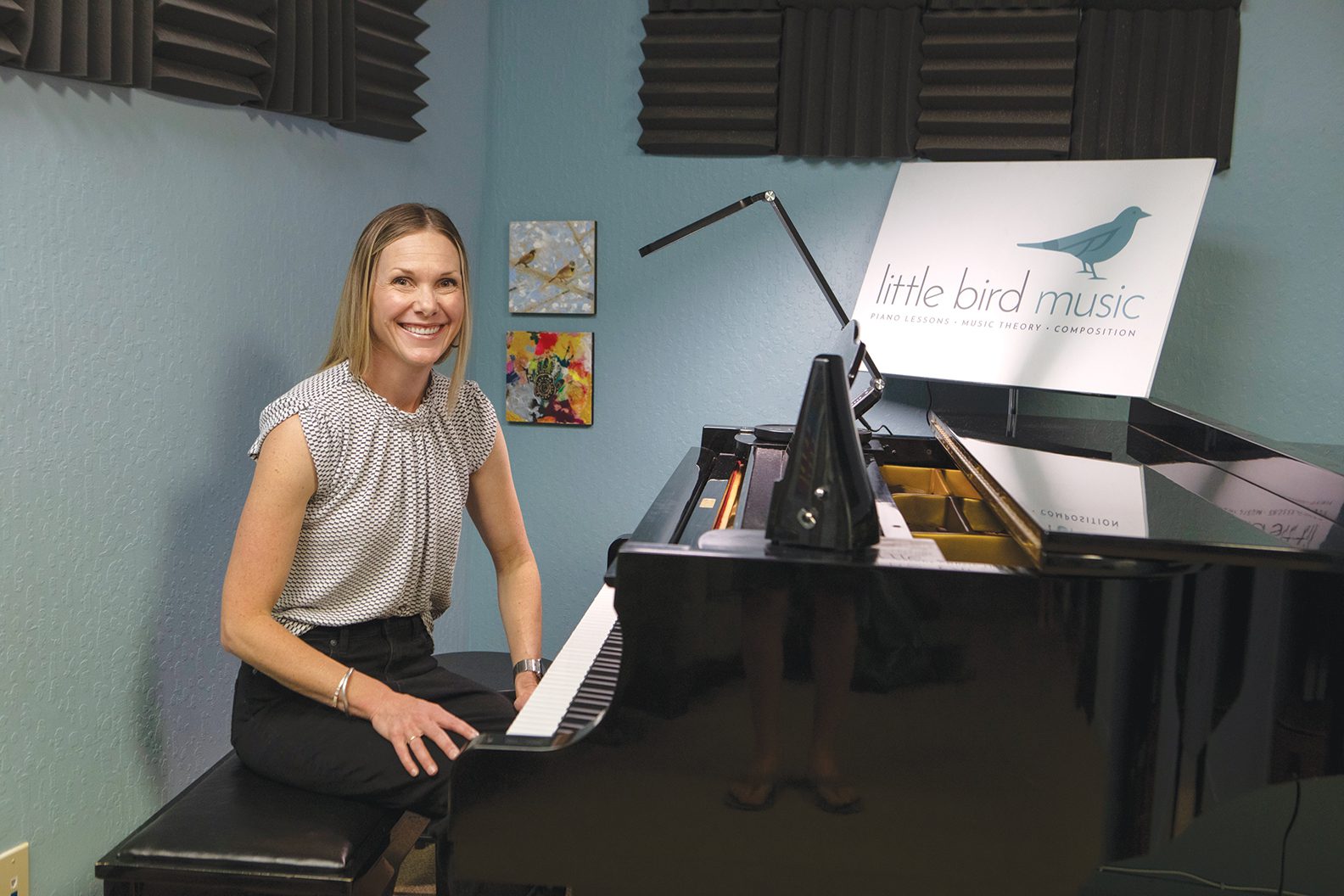
25 Sep Making Music Learning Fun
Students learn to embrace challenge in a nurturing environment at Alice Cotter’s Little Bird Music school, where progression is emphasized over perfection
Allegro: First Movement
Let’s start with some dissonance. Some frustration.
That, unfortunately, is what many adults remember when they recall the piano lessons of their youth: hours spent squinting at sheet music and guiltily plunking out notes in front of a stern teacher who knows they didn’t practice.
Even if you never had the experience, it probably feels like you did. The image—the feel—of that ordeal has been baked into our minds by countless media portrayals of music instructors who peer over rimmed glasses like an owl and drain the life out of whatever song the performance demands.
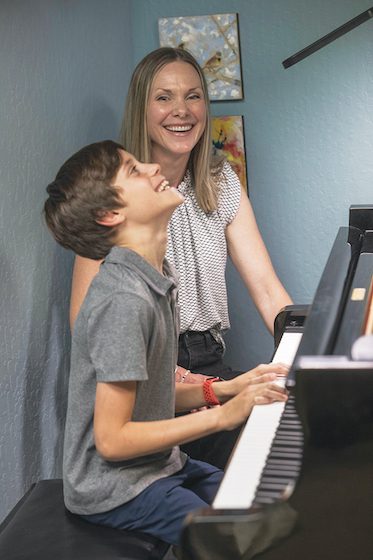
Alice Cotter and Parker Braud share a light moment during a recent piano lesson, photo by Ryan Salm
But now, imagine that dissonance fading into a sweet resolve.
Meet Alice Cotter, Truckee resident and founder of Little Bird Music, offering customized lessons in piano, music theory, composition and—after recently expanding—band instruments.
“I see students from the ages of 4 to 85,” she says. “They come weekly to study everything from beginning piano to how to write a sonata or pop song or even a film score.”
This is not a place for scolding and scowling. Instead, Cotter aims to instill a sense of joy in her students, even as they work through their own inevitable challenges. They may have a recital or other deadline on the horizon but are worried because the song is not coming together.
Cotter explains that in these situations, she has them first take a step back and a deep breath. Then she tells them to focus on a note. A single note.
“Let’s play this note with integrity,” she says, encouraging them to pay attention to their body position, to the weight of their hands—and to truly listen.
“Now combine it with two more notes,” she says. “And link those notes together.”
The idea of building something beautiful one intentional step at a time has become the philosophy that guides Cotter’s overall teaching practice. And it’s working.
She started Little Bird in 2016 with five students. Now, just seven years later, a team of five instructors teaches about 130 students in Truckee, Tahoe and beyond. In June 2023, Cotter also launched MusicWings, a 501(c)(3) nonprofit and scholarship program dedicated to bolstering music education in schools and improving access and equity for students seeking private lessons.
And still, amid this growth, is the teaching, the excitement of inspiring children to “follow their bliss,” the thrill of introducing a new student to a grand piano. Cotter certainly doesn’t shy away from theory and composition and all the technical bits that fledgling musicians can build on, but she also makes space for the levity, the buoyant moments that lift a collection of lines and dots from the paper to send them down through a player’s fingers, into the keys and hammers and strings, and then soaring out into the world.
Adagio: Second Movement
A Nevada City native, Cotter began her own musical journey when her mom enrolled her in piano lessons at age 4. She worked with a teacher who taught the Suzuki Method, which Cotter describes as primarily ear training with “tons of listening” before entering the realm of reading music. This helped her connect to classical music at an early age.
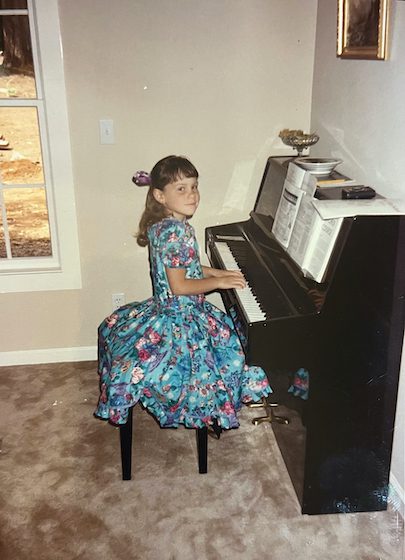
Cotter began playing the piano when her mother enrolled her in lessons at age 4, courtesy photo
Later, she studied music theory with Jean Poff and participated in Certificate of Merit, a comprehensive music study curriculum that involves preparing pieces to perform for a judge, taking theory exams, sight-reading and more—an opportunity she now extends to Little Bird Music students as well.
Cotter says she learned so much from the labor and time spent studying for her exams, she eventually found an incredible freedom that emerged “almost overnight” when she was still a pre-teen and discovered she could truly play the piano.
“This hard work, this challenge, brings so much joy,” she says. “There is a light at the end of the tunnel.”
Cotter went on to study jazz piano in high school and majored in music at UC Berkeley. After college, she moved to Colorado to work for a classical music festival and ski for a season. She then briefly settled in Truckee before earning a master’s degree and, ultimately, a PhD in musicology from Princeton University.
“I went to get my PhD to deepen my knowledge about a subject that I loved,” she says of her move to New Jersey, “and I really had one goal: to come out of that experience braced with the power of education to pursue a life as a writer, teacher and mentor.”
Cotter’s years in academia laid the groundwork for Little Bird not just scholastically, but also geographically. A couple of years before she finished her degree, she moved with her husband Paul, a New Hampshire native, from the East Coast back to Truckee, which was closer to her family and allowed easier access to the San Francisco Bay Area—home of living composer John Coolidge Adams, the subject of her dissertation and ongoing research. She and Paul, who is also an avid skier, knew they wanted to settle in Truckee, so Cotter drafted a business plan during the final stages of her PhD work, kicking off what would ultimately become Little Bird Music.
“Part of the business plan was to create the institution I always dreamed of being a part of,” Cotter says. “That institution meant making music learning fun and engaging and helping students to be curious about challenge instead of running away from it.”
Building from that foundational plan, she hired a friend to design a logo, built a website herself, dropped off flyers at area schools, sent press releases and began teaching.
As for the name, little birds have a long history when it comes to inspiring a love of art and beauty. They are often represented in myth as messengers of the divine. Vivaldi embroidered his Spring with their trills. Beethoven and Olivier Messiaen included them in their notations. Sergei Prokofiev conjured one to face the wolf. They appear in everything from nursery rhymes to campfire songs, Beach Boys to Bob Marley.
Cotter specifically cites St. Gregory—pope and creator of Gregorian chants—as the catalyst for her business name. As the story goes, a little bird landed on his shoulder and sang a song so beautiful, he was moved to develop a way to write it down so he could remember it. Thus, music notation as we know it was born—followed some 1,400 or so years later by Cotter’s studio.
Scherzo: Third Movement
If there’s a motif in this piece, the recurring theme of music and skiing is perhaps most apparent in Zach Lauzon, Little Bird’s newest instructor. An East Coast native who turned 30 in September, Lauzon worked as a professional musician in New York, playing trombone for seven years before deciding to take a break in the snowy West. He landed a job as a ski instructor at Palisades Tahoe two seasons back, which is where he met Cotter’s son Cody, who was on his ski team.
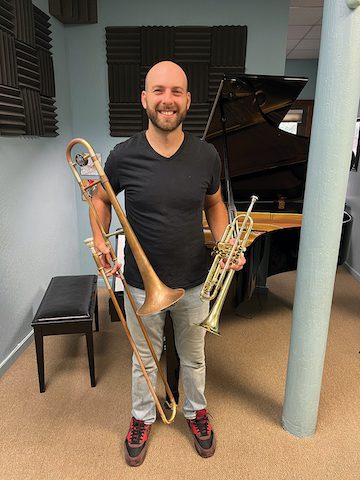
Zach Lauzon is the newest member of the Little Bird Music team, joining as an instructor in April 2023, courtesy photo
Lauzon and Cotter got to talking in the parking lot one day, and when she learned that he used to make a living playing music, she mentioned that she happened to own a music school.
“I was like, ‘Oh no, here we go again,’” Lauzon recalls.
Ultimately, he says he was swayed to return to a life of melodies and harmonies in part because Cotter offered him “the ability to teach young kids band instruments and a love of music.” The stormy spring day he accepted the job—joining fellow Little Bird instructors Brooke Chabot, Jessee Freeman, Vincenzo Pellegrino and Jordan Guldman—he had to ski to Cotter’s house to sign the paperwork.
Lauzon brings almost an orchestra’s worth of instrument knowledge to the primarily piano-focused school—guitar, ukulele, drums, woodwinds, brass. Aside from trombone, he’s mostly self-taught and focuses on playing by ear. (A little riff on the side: Lauzon approaches all of life in this “learn by doing” way, which is how he successfully dropped into the world of ski instruction after just three seasons on the slopes and next plans to tackle scuba, get a private pilot’s license and, eventually, build a real estate empire.)
This philosophy of diving in and immersing oneself in their interests obviously meshes with Cotter’s—and her students’—goals. Lauzon started with a few students at Little Bird in April 2023, took a recent break to hike around Europe and play some gigs in New York, then started teaching again in September.
He also serves as an ambassador to the nonprofit MusicWings, recently visiting Alder Creek Middle School to lead masterclasses with various band sections.
“Alice, she’s an amazing person,” Lauzon says. “As a music teacher, she’s definitely extremely loving and caring for her students and wants only the best for them. She loves music and believes music has a really important role in the development of children, which I completely agree with. She’s been nothing but supportive of me and the things I want to accomplish … allowing me to teach the way I like to teach as well. … I think the world of her.”
In the glow of that support, Lauzon is planning to release a song of his own soon. Feels Like Home—a “pop, soul, rock, electronic, I don’t know” original—should be available under his name on various music streaming platforms in October.
Allegro: Fourth Movement
Cotter says many of her students have been with Little Bird for at least five years, which is longer than a typical undergrad program. This longevity allows her to build deep-rooted relationships with students and be a mentor through many chapters of their lives.
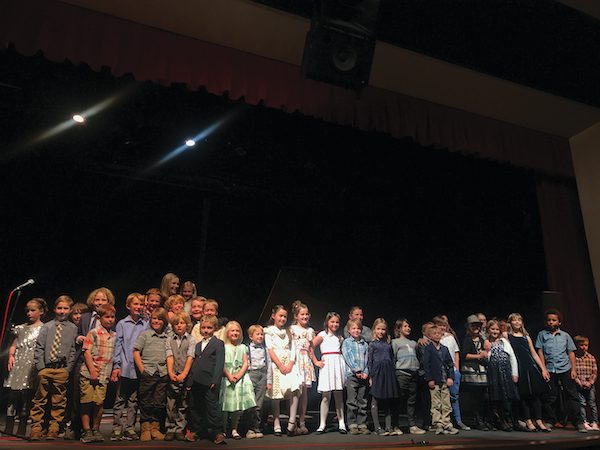
Little Bird Music students beam with accomplishment at a 2018 recital. Five years later, every one of the students is still taking lessons with Little Bird, courtesy Polina Vayner @Laika.Studio.Photography
“Sometimes there are lessons where we play a few songs, and then the student needs a hug. And that’s OK,” she says. “To be a trusted person in a student’s life, that’s a really special thing.”
Renee Deinken of Carnelian Bay, founder of Alpen Lily Web Studio, began sending her 3- and 5-year-old boys to lessons at Little Bird in January 2016—and they both still play the piano under Cotter’s compassionate guidance.
“She is an incredible teacher,” Deinken says. “I watched her teaching style with my older son, and my younger son is more on the soft-spoken and shy side, and how she handled them differently in the way they needed to be handled, it was just so impressive from the get-go.
“It’s interesting, because there are things about both of them that she’s discovered about them as individuals and how they interact with music that have informed my understanding of them. It’s been seven and a half years now that they’ve been with her, and she’s so good at having high expectations of them, but also letting them be themselves. It’s just this magical combination.”
Like Cotter, the boys are also working through the Certificate of Merit program. Deinken says every year her sons protest a bit (“Ugh, I hate this!”), because it requires so much discipline and daily practice. Some days they commit to an hour of diligent work. Others, they last five minutes. But by the end, Deinken says, they feel it’s a rewarding process, so they stick with it.
Her oldest, Kanan, is now in his middle school concert band, as well as the audition-only jazz band—something Deinken attributes to the sight-reading abilities he’s gained through Little Bird. Her youngest, Sylas, started band at the start of the 2023 school year.
“Neither do team sports anymore, so it’s kind of like band is the team sport for them,” Deinken says. “They love it. All of those piano lessons have translated into more than just piano. It’s created this whole other facet of their lives.”
Deinken especially appreciates that Cotter emphasizes to her boys that they have a lot of priorities in their lives—including skateboarding, mountain biking and skiing—so it’s OK to use the Certificate of Merit program as a checkpoint, just to be sure they’re continuing to move forward.
“Progress is the goal here,” Deinken says, echoing Cotter’s wisdom. “It’s not perfection.”
She adds: “That’s not the stereotypical piano teacher we all picture from our childhood.”
Ryan Miller is a writer who lives in the Sacramento area. Follow him on Twitter or Instagram, @jesteram.




No Comments